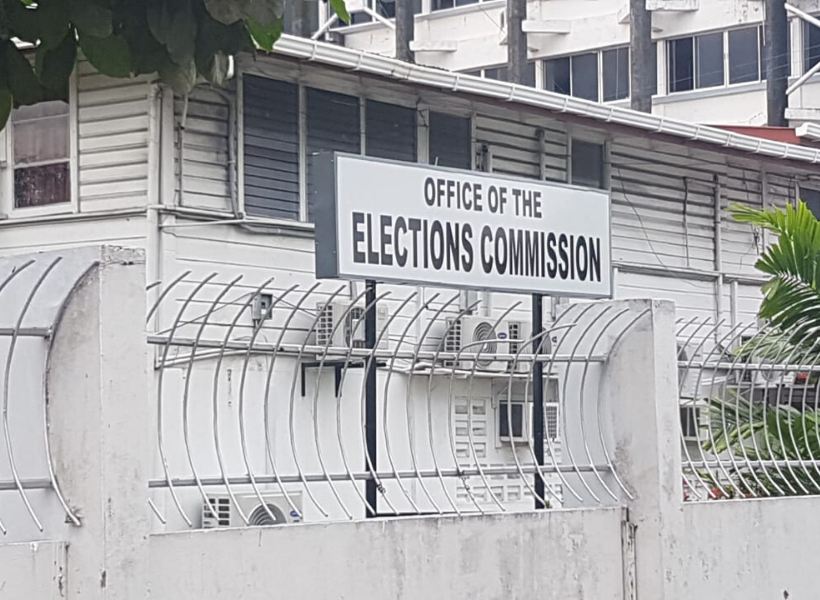In several unprecedented rulings handed down this morning, the Caribbean Court of Justice (CCJ) declared that the No-Confidence Motion was properly passed against Government on December 21, 2018, having acquired a majority of 33 votes of the 65 members in the National Assembly.
Delivering the highly anticipated ruling was the court’s President, Justice Adrian Saunders, who presented a summary of concurring judgments by other judges who heard the consolidated appeals.
The CCJ rubbished Government’s contention that 34 votes — or in other words, “an absolute majority” — was needed for the motion to be successfully passed. The CCJ determined that since the National Assembly comprised an odd number of 65 persons, “When all the members of the National Assembly are present and vote, all that is necessary is clearly, in the court’s view, at least 33 votes.”
In calculating the absolute majority, the government insisted that the 65 members of the National Assembly had to be divided by two, resulting in 32.5. The government contended that since the .5 represents half and there is no half of a person, then that number needed to be rounded to 33, with one being added (resulting in 34) to constitute an absolute majority. However, this formula was thrown out by the CCJ since, according to the court, it was not applicable to Guyana’s National Assembly.
In dismissing submissions by Attorney General Basil Williams and now Director-General at the Ministry of the Presidency Joseph Harmon that the proviso of Article 106 (6) did not apply to no-confidence motions but rather a Motion of Confidence, the CCJ held that this article gave effect to the fundamental principle of responsible or accountable government — a principle that required the government to resign when it no longer enjoyed the confidence of Parliament.
Justice Saunders reasoned, “Whether Article 106 (6) used “a motion of confidence” or “a motion of no-confidence” was unimportant as these were mere linguistic differences denoting different sides of the same coin. There was nothing in Article 106 (6) that prevented any member of the Opposition from moving a motion of no-confidence.”
The CCJ President continued, “Article 106 (6) did not hinge on the provisions of the anti-defection regime set out in Article 156. That regime was separate and distinct from the concept of responsible government and mere sort to prevent a member of the National Assembly from crossing the floor or having been elected to a particular list from disassociating him/herself from that list and continuing in parliament as an independent member.”
The consequences for Article 106 (6) are set out in Article 106 (7) which reads, “Notwithstanding its defeat, the government shall remain in office and shall hold an election within three months, or such longer period as the National Assembly shall by resolution supported by not less than two-thirds of the votes of all the elected members of the National Assembly, and shall resign after the President takes the oath of office following the election.”
The regional court ruled that it had no jurisdiction to inquire whether expelled Alliance for Change (AFC) Parliamentarian Charrandass Persaud, who voted “yes” on the opposition-sponsored no-confidence motion, was disqualified from being a member of the National Assembly. In concurring judgments, the judges held firm that a challenge in this regard has to be done via the provisions set out in the National Assembly Validity of Elections Act, “which required that a petition that Persaud was not qualified for running for office be presented within 28 days after the results of the 2015 elections, out of which the matter arose, was published in the Official Gazette.”
Furthermore, the court held that there was no need to consider whether Persaud’s seat in the National Assembly ought to be declared vacant in accordance with Article 156 (1) (d) of the Constitution. Justice Saunders said that this was so because, “Article 156 (1) (d) applied to supervening events that caused a person to become disqualified while he/or she was a member of the National Assembly, and [Mr] Persaud’s disqualification clearly arose before he became a member.”
In this regard, the CCJ found that it lacked jurisdiction to impeach Persaud’s election to the National Assembly since there was no need to ascertain whether Article 165 (2) preserved the validity of his vote on the motion. Justice Saunders, however, pointed out that even if the CCJ had jurisdiction to declare Persaud’s election to the National Assembly void from the outset, the Court agrees with the lower courts (High Court and Appeal Court) that Article 165 (2) would have preserved the validity of his vote on the motion.
Moreover, the CCJ declared that there was nothing in Article 156 (3) or anywhere else in the Constitution that prohibited Persaud from voting against the government on any particular measure, more so a motion of no-confidence.
Justice Saunders explained that while such a vote may cause a representative from his list to remove Persaud from the National Assembly, his vote would still be valid.
As a result of the CCJ’s ruling, there will be consequences. The CCJ said it will meet with lawyers on Monday, June 24, 2019, to have discussions in this regard.
Chief Justice Roxane George-Wiltshire of the High Court had ruled that only 33 votes were required for the motion to be successfully passed. But the Court of Appeal overturned her ruling. In a majority ruling, the Court of Appeal affirmed that 34 votes, which is an “absolute majority” of all members, were required for the motion to be successfully passed.











